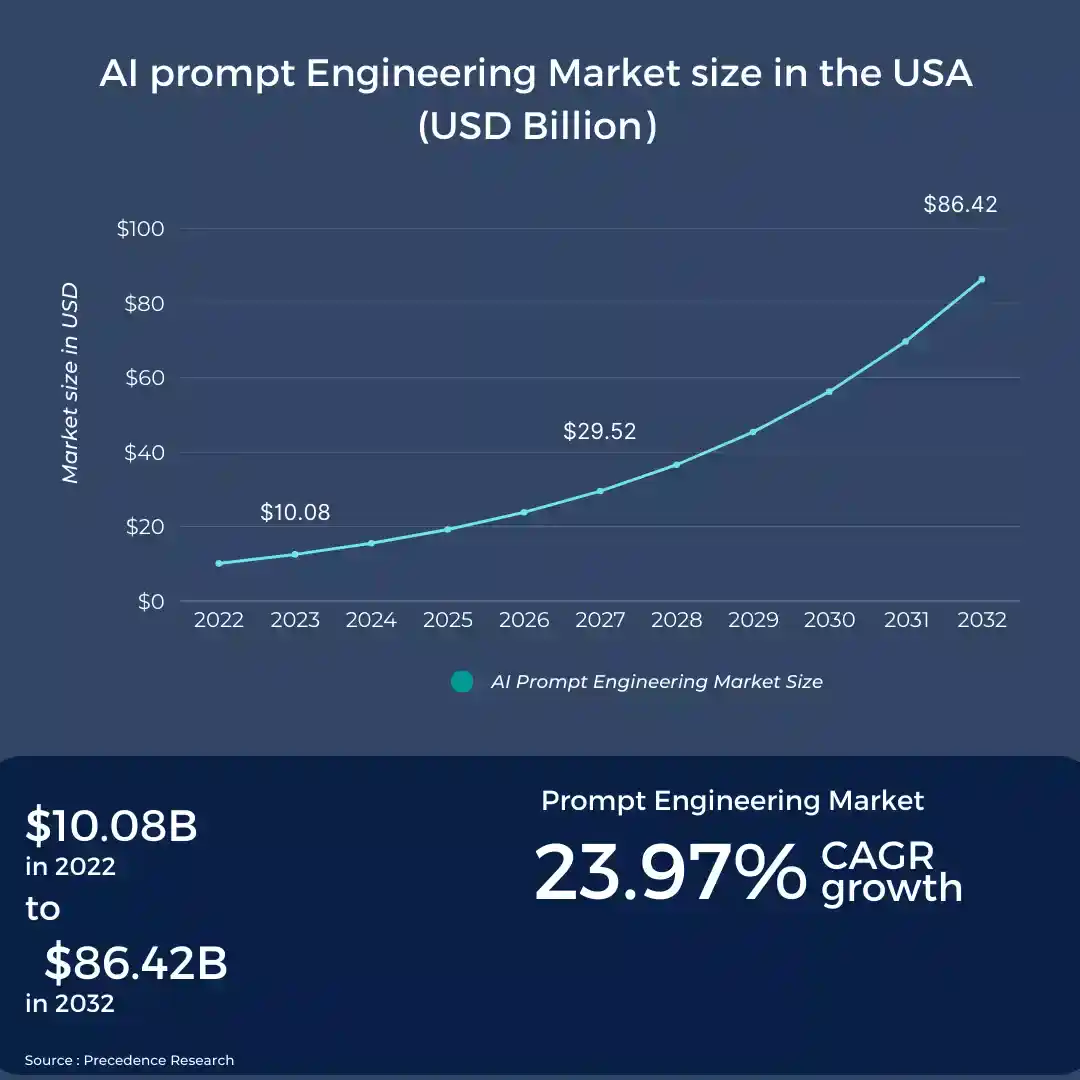Table of Contents
Introduction
In the ever-evolving landscape of artificial intelligence (AI), one role has gained significant prominence – the AI Prompt Engineer. As AI systems become more sophisticated, the importance of crafting effective prompts for these systems has become a critical skill. This comprehensive guide aims to walk you through the essential aspects of becoming an AI Prompt Engineer, offering insights, tips, and resources to help you excel in this exciting field.
What is an AI prompt engineer?
An AI prompt engineer specializes in developing text-based prompts or signals that massive language models and generative AI technologies can interpret and understand. Prompt engineers, unlike traditional computer engineers who develop code, utilize written language to test AI systems for peculiarities.
These individuals are also responsible for training and fine-tuning developing AI technologies like OpenAI’s ChatGPT, Google’s Bard, Dall-E, Midjourney, and Stable Diffusion to provide precise and appropriate answers to people’s concerns.
The Role of an AI Prompt Engineer
AI prompt engineers act as bridges between machine learning (ML) models and the humans who use them. An AI prompt engineer’s goal is to create a collection of inputs and train models to provide the best and most desired outputs for the user. As a result, the function entails producing text-based prompts and feeding them into the back end of AI tools so that they may accomplish activities such as writing an essay, making a blog post, or creating a sales email with the appropriate tone and information.
Because AI systems lack intuition, they rely on human input to interpret human language and inquiries and generate useful prompts.
What is the salary range for AI prompt engineers?
The World Economic Forum has named AI prompt engineering one of the top vocations of the future.
The compensation range for AI prompt engineers might vary greatly. According to several estimates, incomes range from $175,000 to more than $300,000. However, these estimates are based on individual job postings and may not reflect the complete range of earnings in the sector.
Furthermore, compensation can vary depending on geographical region, experience, and the organization or sector hiring for the position.

Skills for becoming an AI prompt engineer
Educational Background and Prerequisites
To embark on a career as an AI Prompt Engineer, a solid educational foundation is essential. A degree in computer science, artificial intelligence, or a related field is highly beneficial. Familiarity with programming languages such as Python and a good grasp of machine learning concepts are prerequisites.
Building a Strong Foundation in AI
To become proficient in crafting effective prompts, it’s crucial to build a strong foundation in AI. Engage in online courses, attend workshops, and pursue certifications in machine learning and natural language processing. Platforms like Coursera, edX, and Udacity offer a plethora of courses taught by industry experts.
Understanding Neural Networks and Language Models
AI Prompt Engineers must possess a deep understanding of neural networks, the backbone of many modern AI models. Dive into the world of language models, especially those powered by transformers like GPT-3. Familiarize yourself with the architecture, training processes, and nuances of these models.
Mastering Programming Skills
Programming skills are the cornerstone of any AI-related profession. As an AI Prompt Engineer, proficiency in Python is non-negotiable. Learn how to manipulate data, implement algorithms, and interact with AI frameworks like TensorFlow and PyTorch.
Exploring Natural Language Processing (NLP)
Natural Language Processing is a key domain within AI that focuses on the interaction between computers and human language. Gain expertise in NLP techniques, sentiment analysis, and text processing to enhance your ability to design prompts that resonate with AI models.
Getting Hands-On with AI Models
Practical experience is invaluable in the world of AI. Experiment with pre-trained models, and undertake projects that involve fine-tuning existing models or creating your own. Platforms like Hugging Face and OpenAI provide accessible APIs and resources to get you started.
Crafting Effective Prompts
The art of crafting effective prompts lies in understanding the nuances of language that trigger desired responses from AI models. Develop an intuition for how changes in wording can influence the output.
Staying Updated with AI Advancements
The AI landscape is dynamic, with continuous advancements and breakthroughs. Stay updated with the latest research papers, attend conferences, and join AI communities to be at the forefront of industry developments. Follow leading researchers and organizations on platforms like arXiv and Twitter to stay informed.
Collaborating and Networking
Building a career in AI often involves collaboration and networking. Engage with fellow AI enthusiasts, join online forums, and attend meetups or conferences to connect with professionals in the field. Share your experiences, seek advice, and stay connected with the AI community.
Creating a Portfolio
Assemble a portfolio showcasing your projects, accomplishments, and the prompts you’ve designed. A well-documented portfolio is a powerful tool to demonstrate your skills to potential employers and collaborators.
Securing Internships and Projects
Hands-on experience is crucial for career growth. Seek internships, freelance opportunities, or collaborate on open-source projects. Real-world projects not only enhance your practical skills but also provide valuable insights into the challenges faced by AI Prompt Engineers in different contexts.
Continuous Learning and Adaptation
The AI field is dynamic, and continuous learning is essential. Embrace a mindset of lifelong learning, be open to exploring new tools and methodologies, and adapt to the evolving landscape of AI technology.
The global conversational AI market is predicted to reach USD 86.42 billion by 2032, up from USD 10.08 billion in 2022, and to grow at a 23.97% CAGR between 2023 and 2032.

What is the Future of AI Prompt Engineers?
The future of AI encourages engineers to be dynamic and transformative as the field evolves. With advances in machine learning and natural language processing, prompt engineering will likely grow more complex, allowing engineers to create more nuanced and context-aware inquiries for AI models. As AI systems become more integrated into numerous businesses, proactive engineers will play an important role in shaping interactions between humans and machines. Algorithm refinement and the investigation of fresh approaches to prompt design will result in more efficient and accurate artificial intelligence answers. Furthermore, as ethical concerns become more prominent, prompt engineers will be instrumental in defining rules to ensure responsible and unbiased AI interactions, paving the door for a future where AI contributes constructively.
Conclusion
Becoming an AI Prompt Engineer is a rewarding journey that requires dedication, continuous learning, and a passion for crafting effective prompts. By building a strong educational foundation, mastering programming skills, and staying abreast of AI advancements, you can position yourself as a skilled professional in this exciting and rapidly growing field. Remember, the key to success lies not only in understanding the intricacies of AI models but also in the art of creating prompts that unlock their full potential.





